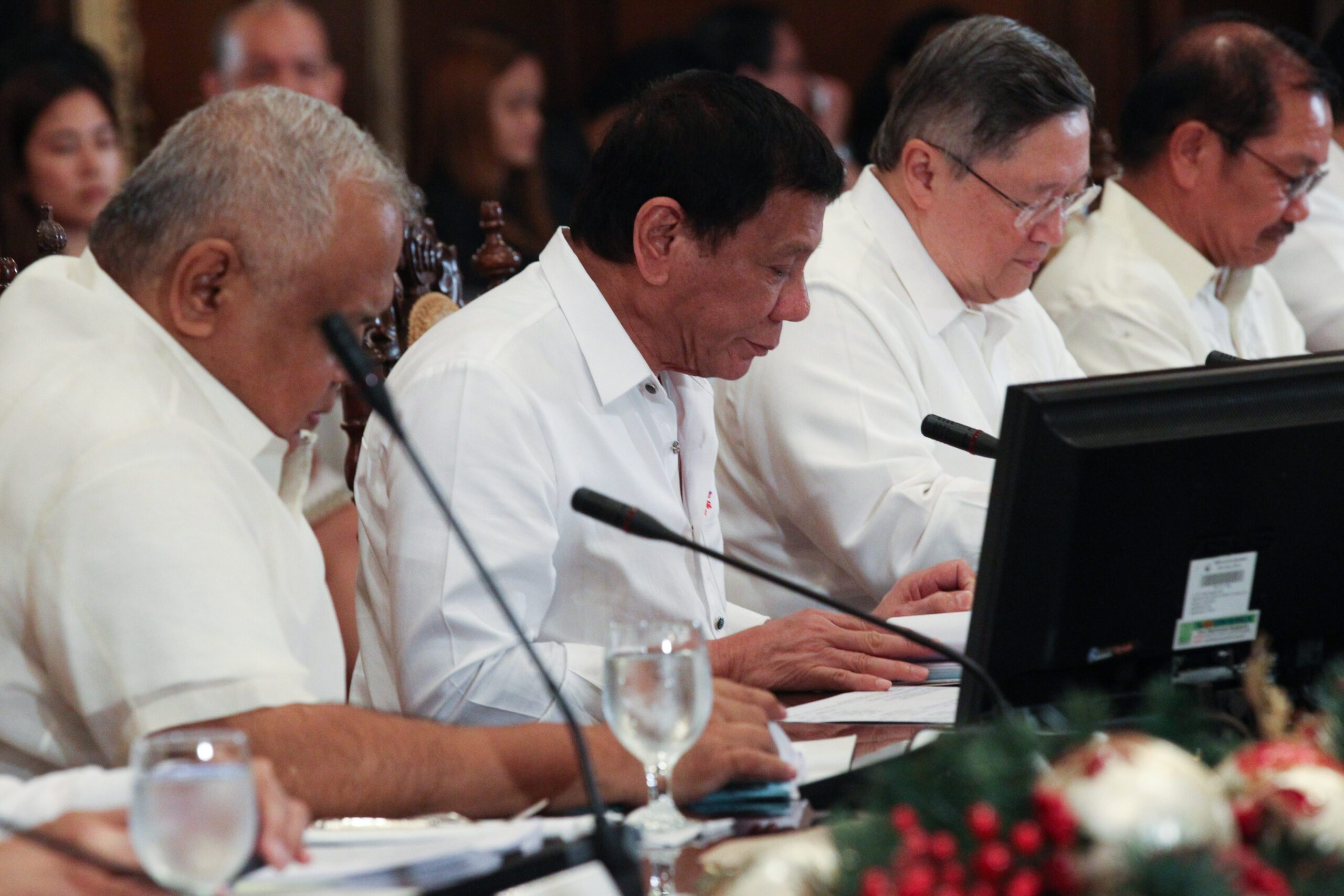SUMMARY
This is AI generated summarization, which may have errors. For context, always refer to the full article.

MANILA, Philippines (UPDATED) – President Rodrigo Duterte on Thursday, December 22, signed into law Republic Act 10924 or the 2017 General Appropriations Act (GAA) amounting to P3.35 trillion, the first under his administration.
The 2017 GAA is 11.6% higher than the 2016 budget and represents 21% of the projected gross domestic product (GDP) for 2017. It is the highest proposed by any administration so far. (READ: 2017 budget priorities: Infrastructure, agriculture, peace and order)
The President thanked lawmakers as well as the Department of Budget and Management (DBM) headed by Secretary Benjamin Diokno for a budget that is “pro-people, pro-investment, pro-growth, and pro-development.”
In his speech, Duterte said the budget will benefit “the poor, the vulnerable, and those in the countryside.”
It is a budget for “real change,” one that “represents the bold plans of the Duterte administration,” the DBM said in a statement.
Biggest pie for education
The Department of Education (DepEd) received the highest allocation for 2017 with P544.1 billion, a significant increase from 2016’s P433 billion. This will be used to maintain basic education facilities, create teaching and non-teaching positions as well as develop and provide learning resources to more than 20 million Filipino students in the country, the DBM said.
“Deserving Filipinos will be given access to tertiary education through the P58.72-billion allocation for state universities and colleges (SUCs) and the P18.7-billion allocation for the Commission on Higher Education (CHED),” the department added.
The 2017 budget also increased allocation for infrastructure, free education for SUCs, universal healthcare, and free irrigation for farmers, among others.
Duterte said farmers will no longer have to pay irrigation fees, because these will be shouldered by the National Irrigation Authority which was granted P38.4 billion for 2017.
The Department of Agriculture (DA) got P45.2 billion, while the Department of Agrarian Reform (DAR) received P9.8 billion.
Highest increase
Of all government agencies, it is the Office of the President (OP) that has the highest increase of funds of more than 600%. (READ: Confidential, intel funds difficult to audit – ex-COA chair)
The DBM earlier explained that the P17-billion increase includes funds for the 50th founding anniversary of the Association of Southeast Asian Nations (ASEAN), which the Philippines will host next year.
The OP also earlier said the budget is meant to cover “increased requirements for intelligence information gathering and other surveillance activities.”
Infrastructure mixed with ‘pork barrel’?
The Department of Transportation (DOTr) is given P53.3 billion, an increase of 25% compared to 2016 while the Department of Public Works and Highways (DPWH) receives P454.7 billion, an 18.3% increase.
On top of this, P850 billion was allotted for the construction of road networks and transport infrastructure to ease conduct of business and mobility of people.
This earned criticism from Senator Panfilo Lacson, who earlier criticized billions of alleged hidden pork barrel or lump sum funds in the DPWH budget.
Lacson questioned the seemingly repetitive “feasibility studies” and “central office” indicated in the DPWH budget. He also questioned the P8.3-billion funds for the Autonomous Region in Muslim Mindanao which was included in the DPWH budget, saying this violates the ARMM Organic Law.
During the bicameral conference committee, the House eventually gave in to Lacson’s proposal. In the end, the P8.3 billion was removed from the DPWH and transferred to the Commission on Higher Education (CHED) for free tuition in SUCs. CHED, however, has yet to iron out the details on what to do with the additional budget.
Lacson earlier challenged the President to veto “pork-like” funds in the 2017 budget to show he is serious in fighting corruption, one of his campaign promises. If not, the senator said he might question the budget before the Supreme Court. (READ: Lacson dares Duterte: Show political will, veto ‘pork’ in 2017 budget)
Doctors to the barrios, LGUs
An additional P1.5 billion has been allocated to the Department of Health’s program, Doctors to the Barrios (DTTB), which makes the total funding for the agency P96.3 billion.
The Philippine Health Insurance Corporation (PhilHealth) was given P53.22 billion to fund universal health care for Filipinos.
“The Duterte administration understands the significance of empowering local government units (LGUs),” the DBM said. “Thus, aside from close to half-trillion (P486.9 billion) Internal Revenue Allotment (IRA), local governments are provided with additional transfers such as the Local Government Support Fund.”
The Department of the Interior and Local Government (DILG) will get a P148.0 billion budget to help the country’s campaign against illegal drugs, construct new jail facilities, and increase the allowance for prisoners, according to the DBM.
The Department of Social Welfare and Development (DSWD) will receive P128.3 billion – P78.2 billion is allocated for the Conditional Cash Transfer program, which provides monthly financial assistance to some 4.4 million poor households.
Crime and security
The Philippine National Police, which leads the administration’s war on drugs, got an increased budget of P110 billion from this year’s P88 billion.
The Department of National Defense received funding of P137.2 billion for territorial defense, including additional subsidy for the repair of Veterans Center, an Expanded Veterans’ Hospitalization Program, and the construction of new cadet barracks. – Rappler.com
Add a comment
How does this make you feel?
There are no comments yet. Add your comment to start the conversation.